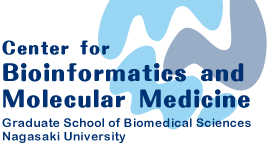
Welcome to the Center for Bioinformatics and Molecular Medicine!
The Center for Bioinformatics and Molecular Medicine is a new research support facility which was established in Nagasaki University Graduate School of Biomedical Sciences in July 2015.
While you may wonder what Bioinformatics and Molecular Medicine means, we are pleased to support as broad studies as possible. The kinds of research activities that the center can support are any research activities that are in any way related to bioinformatics and molecular medicine.
In other words, what the center keeps in mind is to support any relevant studies that deal with their objects at the level of molecules. What follows is a brief introduction of the activities that two assistant professors in the center are doing.
Assistant Professor, Dr. Satoshi Mizuta whose expertise is synthetic organic chemistry, has rich experiences in synthesizing fluorine–containing chemical compounds and developing the methods to synthesize them. As many as 30% of successful low-molecular-weight drugs used today contain fluorines that are artificially introduced in them.
He is making an effort to introduce fluorines into the drugs under development in order for them to have stronger pharmacological effects and lesser adverse effects.
He is also getting involved in developing low-molecular-weight drugs effective against autoimmune diseases such as systemic lupus erythematosus, multiple sclerosis and rheumatoid arthritis, malignant tumors such as lung cancer, kidney cancer, breast cancer, bladder cancer and prostate cancer, and osteoporosis and the like. His aims are to introduce fluorines in these new drugs under development and bring them to the stage of clinical trials.
The center has been involved in the development of drugs for Neglected tropical infectious diseases, drug-resistant microbial diseases, drug–resistant systemic mycosis, drug-resistant viral diseases. It actually developed new drugs against influenza, aspergillosis, candidiasis and hepatitis B.
Assistant Professor, Dr. Hiroki Otaki is using molecular dynamics simulation and homology modeling of those proteins that are the targets of drug discovery and that are difficult to crystallize. He also calculates the affinity between candidate drugs and the target proteins by using quantum chemistry and he is trying to develop various methods to improve the affinity of drugs to the target proteins to get a better therapeutic effects.
The center continues to support any kinds of research and development activities that will lead to new drugs by providing technology briefly described above.
While you may wonder what Bioinformatics and Molecular Medicine means, we are pleased to support as broad studies as possible. The kinds of research activities that the center can support are any research activities that are in any way related to bioinformatics and molecular medicine.
In other words, what the center keeps in mind is to support any relevant studies that deal with their objects at the level of molecules. What follows is a brief introduction of the activities that two assistant professors in the center are doing.
Assistant Professor, Dr. Satoshi Mizuta whose expertise is synthetic organic chemistry, has rich experiences in synthesizing fluorine–containing chemical compounds and developing the methods to synthesize them. As many as 30% of successful low-molecular-weight drugs used today contain fluorines that are artificially introduced in them.
He is making an effort to introduce fluorines into the drugs under development in order for them to have stronger pharmacological effects and lesser adverse effects.
He is also getting involved in developing low-molecular-weight drugs effective against autoimmune diseases such as systemic lupus erythematosus, multiple sclerosis and rheumatoid arthritis, malignant tumors such as lung cancer, kidney cancer, breast cancer, bladder cancer and prostate cancer, and osteoporosis and the like. His aims are to introduce fluorines in these new drugs under development and bring them to the stage of clinical trials.
The center has been involved in the development of drugs for Neglected tropical infectious diseases, drug-resistant microbial diseases, drug–resistant systemic mycosis, drug-resistant viral diseases. It actually developed new drugs against influenza, aspergillosis, candidiasis and hepatitis B.
Assistant Professor, Dr. Hiroki Otaki is using molecular dynamics simulation and homology modeling of those proteins that are the targets of drug discovery and that are difficult to crystallize. He also calculates the affinity between candidate drugs and the target proteins by using quantum chemistry and he is trying to develop various methods to improve the affinity of drugs to the target proteins to get a better therapeutic effects.
The center continues to support any kinds of research and development activities that will lead to new drugs by providing technology briefly described above.
Mitsuko Masutani



